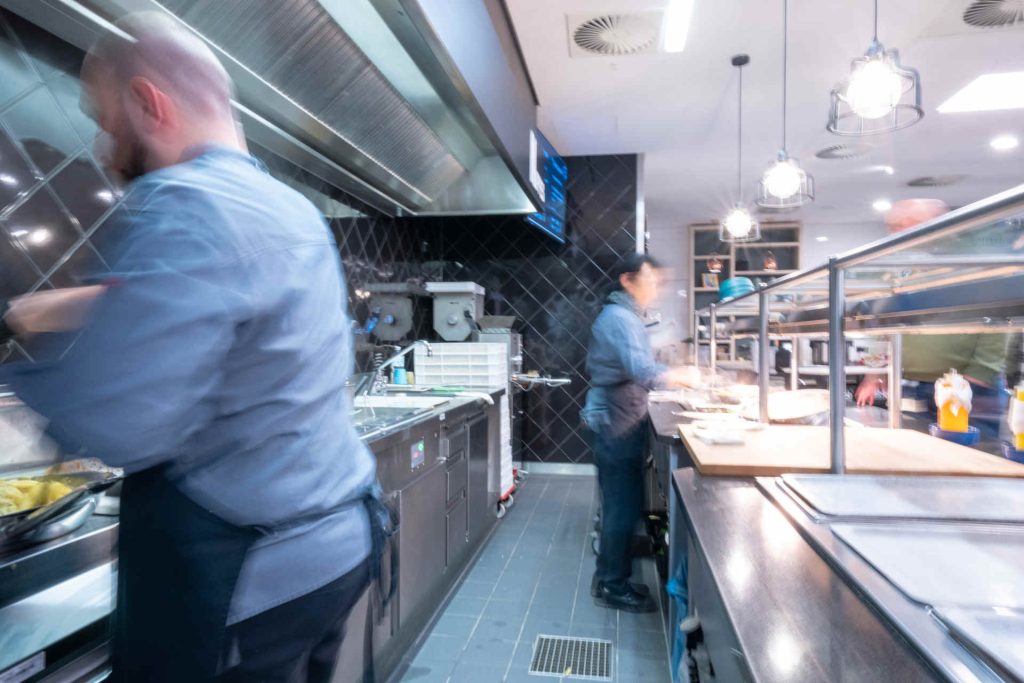
Intelligent cooking systems, resource-saving water technologies and well thought-out processes: new studies and practical examples show how digitalization and sustainability go hand in hand in professional kitchens. What the industry can learn from this – and why investing in smart systems is worthwhile.
The results of the practical study “Increasing the efficiency of commercial kitchens”, carried out by Weihenstephan-Triesdorf University of Applied Sciences together with Rational, speak for themselves: modern kitchen technology not only saves water and energy, but also improves the quality of the food and the working conditions for staff.
The study focused on the kitchen conversion of AXA Konzern AG in Cologne. The use of intelligent cooking systems such as the iVario Pro and iCombi Pro as well as the ConnectedCooking digital management system made it possible to achieve remarkable savings.
“For example, water consumption was reduced by 47.9%”, emphasizes study director Prof. Dr. Michael Greiner. The energy saving of 24.1% was also significant, despite the additional blast chiller. A key result: it's not the connected load that counts, but efficient operation - power peaks were reduced by 20.5%, which lowers energy costs in the long term.
In addition to ecological and economic factors, the perspective of the employees was also taken into account. Height-adjustable cooking systems and an optimized production model (e.g. cook & chill process) ensure ergonomic working and relieve the team through better planning. Food quality increases - not least because food no longer has to be kept warm for hours. “Modern technology makes everyday work easier and makes kitchen jobs more attractive - a real advantage in view of the shortage of skilled workers”, says Greiner.
The hotel sector also shows how innovation and sustainability can go hand in hand. The voco Brussels City North Hotel relies on water-saving faucets from hansgrohe combined with the intelligent gray water recycling system from Hydraloop. With success: around 1.2 million liters of water are saved there every year.
The EcoSmart technology ensures that mixers and showers significantly reduce water consumption - while maintaining the same level of comfort. At the same time, the shower waste water is treated using Hydraloop technology and reused for toilet flushing.
“By combining water-saving technology with a well thought-out recycling concept, we can unite sustainability and design,” explains Hotel Manager Steven Vandevelde. An approach that has been rewarded with the Green Key certificate for sustainability - and can serve as a role model for the industry.
Whether in commercial kitchens or hotel bathrooms - the way to greater sustainability is through intelligent technologies and well thought-out processes. The examples show impressively that investing in smart kitchen appliances, water recycling and energy-efficient systems not only pays off ecologically, but also economically. For the industry, this means that those who modernize now not only strengthen their future viability, but also their attractiveness as an employer and guest satisfaction.

In 2025, bread is no longer a supporting actor – but a stage, a message and an experience. In Austria and Germany, the bakery trade is experiencing a renaissance between tradition, technology and new worlds of enjoyment. From ancient grains to smart baking: anyone who wants to set standards in the hotel and catering industry should be aware of these trends – and take advantage of them.
With her stylish handbook “What makes guests happy”, Katerina Vetter Kapagiannidou opens up a fascinating perspective on how food, ambience and communication work together to create unforgettable experiences. This book is much more than a classic cookbook – it is a source of inspiration for hosts who want to delight their guests not only with food, but also with thoughtful details and a unique atmosphere.
The 40 recipes, divided into six chapters and tailored to different occasions – from relaxed evenings with friends to elegant business dinners and romantic dates – combine indulgence with aesthetics. It’s not just about the right choice of food and drink, but also about the art of creating an atmospheric table setting that stimulates or deliberately directs communication.
The author’s in-depth specialist knowledge is particularly enriching, as she is an impressive communications expert and experienced hostess. Her anecdotes from her work – such as hosting state dinners or encounters with personalities like Karl Lagerfeld – give the book a personal and practical touch. The numerous tips on topics such as the right choice of wine, perfection in small mistakes and setting up an inviting kitchen make it an indispensable reference book.
Info:
Edition Michael Fischer / EMF Verlag
ISBN 978-3745920253
256 pages
With “Kombucha selbst gemacht”, Alexandra Klein takes us into the fascinating world of Kombucha brewing. This book is a real treasure trove for anyone who wants to learn more about fermented drinks and creative kombucha recipes. In just 120 pages, the author manages to give a sound introduction to the production of the probiotic drink and at the same time present numerous inspiring recipes for drinks, dishes and even beauty treatments.
We particularly like the practical approach. From the care of the scoby (“Symbiotic Cultures of Bacteria and Yeast”) to step-by-step instructions, getting started with kombucha brewing is made as easy as possible. Whether strawberry-peppermint kombucha, lavender-pear or something unusual like kombucha hummus – the recipes are creative, versatile and invite you to try them out.
The beauty aspect is also surprising and innovative: Kombucha as a base for a face mask? This shows once again how versatile this drink is. Alexandra Klein combines her in-depth knowledge as a professional chef with her flair for herbs and natural ingredients, giving the book a personal and authentic touch.
Info:
Servus Verlag
ISBN 978-3-7104-0383-5
120 pages


Intelligent cooking systems, resource-saving water technologies and well thought-out processes: new studies and practical examples show how digitalization and sustainability go hand in hand in professional kitchens. What the industry can learn from this – and why investing in smart systems is worthwhile.